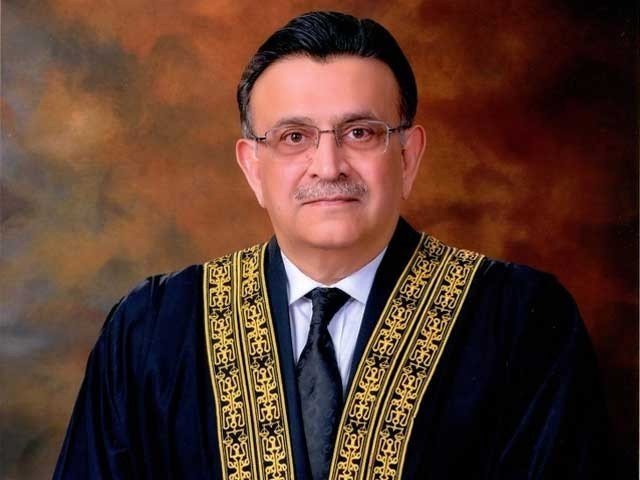ISLAMABAD: Chief Justice of Pakistan (CJP) Umar Ata Bandial said on Tuesday that it is clear the Election Commission of Pakistan (ECP) has no authority to extend the polling date.
The CJP’s remarks during the hearing of petition filed by the Pakistan Tehreek-e-Insaf (PTI) against the Election Commission of Pakistan’s (ECP) decision to delay elections in Punjab till October 8.
A five-member larger bench, headed by CJP Bandial, and comprising Justice Ijazul Ahsan, Justice Munib Akhtar, Justice Aminuddin Khan and Justice Jamal Khan Mandokhail presided over the hearing.
As proceedings commenced, Attorney General of Pakistan (AGP) Usman Awan raised questions over the maintainability of the PTI’s petition, arguing that matters related to the elections should be referred to the Lahore High Court (LHC) after two apex court judges issued their detailed opinion wherein they held that the earlier suo motu in the matter was dismissed by 4 – 3.
He said that the LHC had not given the president the authority to announce the election date. The AGP also requested the court to constitute a full bench to preside over the case.
However, CJP Bandial stated that the present case was a completely different matter wherein, the apex court is examining whether the ECP had the authority to postpone the election date.
He observed that the “question before the court is a simple one, can the ECP postpone the election date or not”. “If it has the authority to do so, the proceedings will end right there,” he said.
The recently appointed AGP argued before the court that two SC judges had given their verdict on the matter earlier.
However, CJP Bandial held that the opinion expressed by the two judges was not relevant in this matter.
“If the verdict was 3 – 4, then the ‘breached’ orders do not exist,” responded AGP Awan. “In fact, if there were no court orders, then the president had no authority to give an election date even,” he added, urging the court to first settle the issue of SC’s March 1 orders.
CJP Bandial observed that the AGP’s arguments were based on a “technical point” while the bench was seeing the question raised in the application.
He also urged the AGP to refrain from “complicating” the matter by asking questions that would delay the proceedings.
The CJP asked Awan to raise these points in a separate application, saying that the issue before the court was not about “the fixing, rather the postponement of the election date”.
Justice Mandokhail remarked that the court would examine how the ECP was empowered to extend the election date.
Justice Aminuddin Khan questioned whether the election schedule could be “reduced to less than 90 days”, while Justice Ijazul Ahsan observed that the ECP “has the right to adjust the election schedule within 90 days”, but added that it could not exceed the 90-day limit.
“Ninety days have been surpassed even now,” observed Justice Mandokhail, adding that polls “must take place under all circumstances but now the question is who will exceed the election date beyond the 90-day limit”.
“The other question is, should an assembly be dissolved at the whims of one person alone,” remarked Justice Mandokhail.
PTI’s lawyer Ali Zafar responded that “prime ministers and chief ministers are elected representatives of the people.
“If the premier’s own party wishes to initiate a vote of no confidence against them, then the assembly can be dissolved,” said Justice Mandokhail.
“If a motion is moved for a vote of no confidence, then the assembly cannot be dissolved,” replied Ali Zafar, to which Justice Mandokhail said, “should the parliament not take this issue up?”
“The parliament can debate the powers of the prime minister and the chief minister,” said Zafar.
“The first principle of the constitution is Islam and the second is democracy,” the PTI lawyer stressed, “and democracy only exists through elections”.
“The ECP has the powers granted under Section 58 to ensure elections,” he added.
“What would happen if the ECP reverses its decision and says nobody is supporting the electoral body in holding elections,” inquired Justice Mandokhail.
“The commission will have to turn to the court to resolve the difficulties it faces,” the judge observed.
Later, CJ Bandial questioned how elections could be delayed “for such a long period” by the electoral body.
“When Benazir Bhutto was martyred, elections were only delayed by 40 days,” the judge observed, noting that at the time “protestors had set ECP offices on fire” and “the entire country was in the grips of demonstrations”.
The CJ stressed the need for “political stability” and “maturity” to hold elections.
“The ECP’s decision was drafted with haste,” he remarked, “the commission had no authority or legal provisions available to extend the election date”.
PDM to become party in case
Meanwhile, Pakistan Peoples Party (PPP) Senator and former law minister Farooq Naek requested political parties be made parties to the case, arguing that they were also “stakeholders” in the issue at hand.
Earlier, coalition parties in government decided to become parties to the case, whereby PPP, PML-N and JUI-F are expected to file their applications.
On the matter, Federal Law Minister Azam Nazeer Tarar maintained that the ECP is independent of all orders.
“We had said it on the first day, the verdict is 3-4,” said the minister as he reached the SC premises, “the ECP was merely doing its job as per Article 218(3)”.


No comment